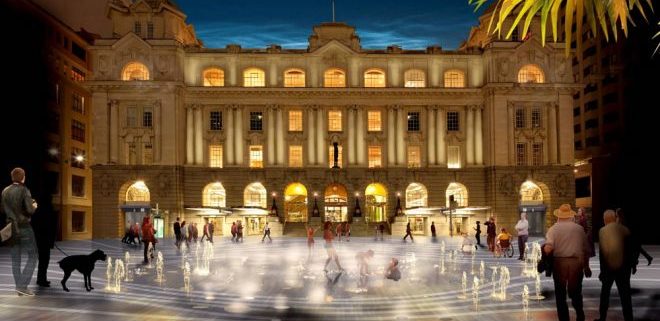Tripartite Summit: Liveable Cities – Britomart as a common ground
- Until the early 1900s, rail in Auckland came right into the bottom of Queen Street. It has recently returned to Britomart – albeit underground – and has been integral to the evolution and revitalisation of Auckland’s CBD.
- Britomart has become a gateway for Auckland and is helping to remove barriers and hurdles between cultures.
“Britomart creates bigger opportunities every day in front of our eyes… so don’t blink.” – Daijiang Tai
Jeremy Salmond, from Salmond Reed Architects provided context at the Tripartite Economic Summit on the history of Auckland’s Britomart precinct. Up until the early 1900s, rail in Auckland came right to the bottom of Queen Street, until the reclamation of land drove rail out of the city centre.
“The manner in which a community deals with historical remnants varies considerably,” he said. In Auckland, this has largely been an accident of timing. Britomart is one of a number of well-preserved precincts in New Zealand that has found a new use, and is now widely regarded as a historical asset with significant commercial potential.
The return of rail to Queen Street – albeit underground – could be seen as a virtuous circle. Britomart represents a remarkable tale of survival in Auckland. The structural and geopolitical history of Auckland’s streets and buildings remain relevant and integral to the evolving city of the future.
Daijiang Tai, from Cheshire Architects, spoke about the current function of Britomart in Auckland, and used its development as a case study about Auckland’s engagement not only with businesses and the local community, but with the world.
The values that New Zealand has been known for historically have been strongly recognised recently with Chinese audiences: clean water, fresh air, quality products, friendly people. The Chinese market is a recognised pathway for New Zealand businesses to grow, largely due to the sheer size of the market and ongoing growth and rapid urbanization in China.
Auckland – like many cities – has seen these two cultures living side-by-side for a long time. But the two worlds have only recently started to collide. It is important that Auckland curates the collision as it takes place, in order to ensure it comes together in the best possible way, maximising the opportunity.
Britomart was used as a good example of a ‘common ground’. Tai explains that hospitality is something that everyone can appreciate – regardless of their culture or the language they speak. When hospitality is delivered to the highest standard, it brings people together, and provides a solid base for engagement. “This is the foundation for Britomart, and was at the core of its transformation from a commercial wasteland to one of the city’s most successful precincts,” he said.
Tai hopes that people think of the Britomart precinct as a gateway – “it is an access point for the best resources and professionals in the city,” he said. “Britomart can help remove barriers and hurdles between cultures, which is critically important, as we must engage with the wider world and improve ourselves through healthy competition.”
On a higher level, Tai emphasised that we must deconstruct and rebuild our perceptions. China is growing at a massive speed, and so fast, that it is very hard to get a grasp on it. We have to look at the Chinese market with fresh eyes. It is changing so quickly, that we need to do that every day.
For the first time, said Tai, we can say the same thing about Auckland. The city provides much more than just clean water, fresh air, and quality products. Britomart is the most successful precinct in the city – because it is adaptive. It is ready to change and becomes something new every minute, constantly creating space for more to happen through old businesses and new courtyards. This mentality is shared by council, architects, and operators, and gives the precinct the speed and ability to collaborate across all disciplines and sectors.
As Auckland is so small, and at the same time culturally, technologically and socially adaptive, it can react and change faster than almost everywhere else. It is the perfect global test tube for urban change.
Britomart created a common ground before anyone realised it. The injection of different cultures will open opportunities the city never knew existed, which in turn allows us to become a complex and vibrant city. New spaces will create new forms of cultural entertainment and allow the cross-pollination of ideas to take place.
Tai’s closing statement to the Summit summed this notion up: “Britomart creates bigger opportunities every day in front of our eyes… so don’t blink.”




Leave a Reply
Want to join the discussion?Feel free to contribute!